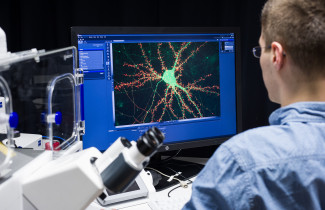The doctoral dissertation in the field of Biomedicine will be examined at the Faculty of Health Sciences at Kuopio campus. The public examination will be streamed online.
What is the topic of your doctoral research? Why is it important to study the topic?
The topic of the doctoral research is related to genetic variants that can reduce the risk of developing Alzheimer’s disease (AD). AD leads to pathological changes in the brain, which are manifested as memory problems, changes in behavior, and cognitive decline. AD is the most common cause of dementia. In 2020, there were over 55 million people worldwide living with dementia, and the number is expected to rise over time due to increases in population growth and population aging. To this day, there are no existing therapies for the effective prevention or treatment of AD. The first symptoms typically appear decades after the onset of pathological changes in the brain. Therefore, it is not only important to find disease modifying treatments, but also biomarkers that enable an early diagnosis. One key pathological feature of AD is the accumulation of beta-amyloid plaques in the brain, which are composed of toxic cleavage products from amyloid precursor protein (APP). While beta-amyloid is mainly produced by neurons, another brain cell type has attracted much attention in recent AD research. Microglia, the immune cells of the brain, have been shown to counteract the progression of AD for example by taking up beta-amyloid through a process called phagocytosis, but their activation may have negative effects as well. Even though there are some known modifiable risk factors for AD, the disease has a strong and complex genetic background. In recent years, close to 100 genetic AD risk loci have been identified, some of which confer protection against the disease. The aim of this thesis was to study the function of three different AD-associated genetic variants and protein modifications in cultured cells, mouse models, and carriers of the genetic variant.
What are the key findings or observations of your doctoral research?
We investigated the mechanisms of a recently identified genetic variant called PLCG2 P522R, which protects individuals that carry the variant from AD. In our mouse study, we found that this genetic variant modulates the function of immune cells both in isolated cultured cells, as well as in the mouse brain. Specifically, it promoted functions such as cell survival, inflammation, and phagocytosis. These findings support the idea that certain aspects of inflammation may be beneficial in AD. In the second study, we investigated a protein called MECP2 and its modification at a specific phosphorylation protein site. This is interesting because the phosphorylation of MECP2 at the S423 site is moderately reduced in early stages of AD in human post-mortem brain samples. We found that if MECP2 is not phosphorylated at S423 site, it may support neuronal viability and protect neurons when they are cultured together with activated microglia. In the third study, we investigated the AD protective APP A673T variant, which lowers the production of beta-amyloid. We found that besides beta-amyloid, this variant also reduces another APP cleavage product called sAPPβ in the human cerebrospinal fluid. We found a similar outcome in 2D and 3D cell culture models of AD, showing that this genetic variant effectively protects from the cellular processes relevant for AD pathology.
How can the results of your doctoral research be utilised in practice?
In the future, combining findings from functional studies like this one, may guide the identification of clinically relevant biomarkers and the development of treatments that target AD at multiple levels. The results of this doctoral research emphasize that modulation of certain proteins and protein interaction pathways may serve as therapeutic approaches against AD.
What are the key research methods and materials used in your doctoral research?
Different model systems have been used to study the function of AD-associated risk factors. Those models included cultured neurons and immune cells, a mouse model, and the analysis of human biofluids.
The doctoral dissertation of Rebekka Wittrahm, Master of Science, entitled Protective genes and molecular mechanisms in Alzheimer’s disease, will be examined at the Faculty of Health Sciences. The Opponent in the public examination will be Professor Aleister Saunders of Drexel University, Philadelphia, USA, and the Custos will be Adjunct Professor Mari Takalo of the University of Eastern Finland. The public examination will be held in English.
Publix examination
Doctoral dissertation (link available later)



